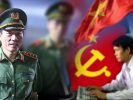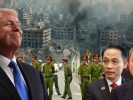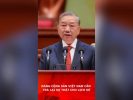
Recently, Vietnam’s highest legislative body National Assembly (NA) attracted the attention of public opinion when its member speaking publicly at the parliament advised the Minister of Public Security that the number of police officers was too large.
„Sorry Minister, the police force is too crowded,“ said Legislator Sung Thin Co of the Ha Giang province’s delegation, to the head of the Public Security branch, member of the Politburo, General To Lam, during a discussion session regarding the police force and security at the grassroots level.
On November 24, 2020, a number of Vietnamese political and news analysts from domestic and overseas exchanged with BBC News Vietnamese about the meaning and what can be drawn from this statement.
„At the discussion of the NA on Law on forces involved in protecting security and order at the grassroots level“ on November 17, Legislator Sung Thin Co told Minister of Public Security To Lam that “Sorry comrade, but there are too many police officers.’ Mr. Sung Thin Co’s remarks reflect the fact that the police sector is growing more and more soldiers and generals,“ research Le Van Sinh from Hanoi National University told the BBC.
„Fortunately, the bill was not approved by the National Assembly. Assuming, the National Assembly of Vietnam passes this bill, the police will have a force of about 1.5 million people, which is an estimated 150 policemen for every 1,000 people.
„I would like to ask the question that why a peaceful country needs too many policemen? Why it needs hundreds of generals? During the Vietnam-US War, the regular army of Vietnam did not have a large number of generals and soldiers. This question is not only posed to the leaders but also to the people of Vietnam as well.”
„Indeed, the recent increase in the police force reflects the concerns of officials about their social leadership role. The trend of the security of the state apparatus has been formed and increasingly happening. over decades.“
Power is too great, what are the consequences?

Also from Hanoi, on November 23, former security major Nguyen Huu Vinh, who had many years working at the Ministry of Public Security, expressed his wish to have more “bold” voices against the police forces:
„In my opinion, the fact that a member of the National Assembly raises the issue of the ‘overcrowded’ police, and then publishes it in the media, is clearly a rare thing. In the past, by default, the police forces were hardly discussed in depth its internal irrationalities, from training, organizational structure, budget, to professional work.”
„While other sectors such as education, health, agriculture, etc. are always subject to dissection in the press and parliament. Then how can it help to correct internal irrationalities, even there must be reform. The machine „squeezes“ this place „swells“ there; the operation is closed; the power is too great, etc. It is easy to see what the consequences will be.”
„I hope that also from the recent questions of the National Assembly members with the police, there will be more and more bold voices that will help this force reduce negativity and improve work efficiency.“
From Hanoi, lawyer Le Quoc Quan said that the statement of the Vietnamese National Assembly member was „correct„:
„I see clearly that the Ministry of Public Security is taking many steps to strengthen its power, such as interfering with citizen data management, suggesting transferring driving teaching to the Ministry of Public Security and especially the bill for building a force to protect grassroots security and order, group the entire population, civil defense, part-time police … to build a unified force with a payroll of up to 1.5 million people.”
„In addition, at present, the Ministry of Public Security is also building a coordination mechanism between the Ministry Party’s Central Committee and the Party Committees of provinces and cities to form a unity, throughout from central to grassroots levels. Legislator Sung Thin Co’s expression is correct because I always have the feeling that the police forces are very crowded. I don’t have specific statistics, but they use a dozen police officers to place every dissident under de facto house arrest. The great number and the power will surely grow with it.
From Taipei, Taiwan, lawyer and journalist Trinh Huu Long said that the speech of the National Assembly deputies was not a coincidence but a statement that he considered „teasing“ the Vietnamese police.

„There is certainly an anomaly here, but in observing and monitoring, the police sector in recent decades has tended to expand, tending to increasingly occupy important positions in the state agencies, tending to encroach on other interest groups within the government.”
„In my opinion, Mr. Sung Thin Co is not a coincidence saying that no one suddenly goes to „tease“ the police and the Ministry of Public Security leaders like that. It should be noted that Mr. Sung Thin stork is a general in the army, in his statement, I think it is possible to represent a group in the army feeling overwhelmed by the police, feeling their power in the government apparatus less and less, as well as social management, due to the encroachment by the police and the Ministry of Public Security.”
„It can be seen as the voice of an interest group and I think there are many other interest groups within the Communist Party and within the government that is feeling a growing pressure from the police and the Ministry of Public Security believes that the sector is encroaching on them, putting pressure on them to be affected like this and that and affecting the interests of many people.”
„Therefore, it is understandable and predictable that interest groups that have suffered damage or pressure to speak up like that are understandable and predictable, but this is an indication that the Ministry of Public Security has crossed the red line and caused challenge, react to the stamina and acceptability of interest groups from other branches of power and force the affected group to react as stated above by legislator Sung Thin Co.”
„And through this, it is not excluded that there are also progressive forces within the party itself that feel that Vietnam is following the trend of a“ police state „with too large a scale, so warnings are required to stop.“

A trial in Hanoi
From Hanoi National University, Mr. Le Van Sinh argues that the tendency to be considered a „police state” in Vietnam is becoming clearer and tries to discuss the future of this trend from a historical perspective.
„When a political party asserts itself as ‘the only force leading the State, leading the society’ (Constitution 1980 and 1992, 2013,) it is also time for that political party to find all measures and how to maintain ultimate power in its hands and, in order to maintain the party’s rule, the trend of ‘Police rule, security rule’ in my opinion is a must.”
„Observing the state apparatus from wards and communes to the highest level, and the growing force expanding and the expansion of the power to manage the population of the police over the past few decades, we can easily to recognize the tendency of the police to rule more and more clearly.”
„However, the history of the modern world and humanity shows that authoritarian states, party rule bring poverty and suffering to the people. Sooner or later this kind of state will be eliminated.“
„Fake alarm“ about hostile forces?

Former security major Nguyen Huu Vinh mentions an aspect of his concern that he calls „false alarms“ that may be being exposed by the security and security sectors in Vietnam.
„It is through the press, through the statements of many leaders, it seems that ‘hostile forces’ are operating formidably, and they can destroy the communist regime soon. Then always Viet Tan … In the health sector, incorrect diagnosis and overdose of drugs easily cause poisoning, worsening illness, and death.”
“The same goes for „political security,“ overestimating the danger of ‘hostile forces’ to the point that such ‘false alarms’ are also very dangerous. The essence can be controlled too much, leading to unsettled psychology, discontent, inhibiting the development of creativity, etc.”
„As for the profound downsides of the ‘false alarm“ approach, it is impossible to mention all. In the end, the hidden contradictions that gradually accumulate are difficult to measure, once natural disasters or epidemics are difficult to control, a foreign invasion … easily broke out unpredictable society, or at least lost the necessary cohesion of the whole society to overcome the crisis.“
Lawyer Le Quoc Quan thinks that „right and wrong“ should not be discussed with the role and position of the police in Vietnam today and he explained his point of view.
„I think Vietnam is a model of Party rule, the Ministry of Public Security is only considered as a sword to protect the regime and protect the party. To make the sword increasingly sharp and the rule is bigger, police officers are enjoying privileges. If they have privileges, they will be absolutely loyal. I see there is a slogan that was previously mentioned in the police as ‘the party exists so do we.’
„That story is very clear and ingenious, to be blunt is to protect the party’s position, the party’s monopoly on leadership is like protecting the police force, nothing else is needed. My experience is clear, they work according to the leader, they just don’t hit it, why do they do that. Before many times working with me they all said ‘It’s imperative to obey absolutely, don’t talk about right and wrong’.”
Two reasons for the bulging apparatus?

Lawyer and journalist Trinh Huu Long from Taipei said that the reason for the „bulging“ of the Vietnamese police apparatus and the army was rooted in institutional issues, and according to him there were two points to say about reason, cause.
„In my opinion, there is an institutional reason here, first in the general tendency of the state apparatus to expand, the reason for the bulge is because the Vietnamese Communist Party has ambitions to control Vietnamese society in an extremely large scale that encompasses the trio of markets, civil society, and foreign elements and forces.”
„As the size of the population and activities in the society grows and increases, the state apparatus also grows with and moreover with the mechanism of applying for, giving, bribing, or bribing to run for jobs in Vietnam. Man, a person who runs into the state office will have a need to ‘recover capital’ spent to run, and one way to recover capital is to become a recruiter for the state apparatus and receive money to run. Well, that mechanism always causes the state apparatus to swell. That’s the reason why people have been unable to streamline the payroll for a long time.“
„With that kind of mechanism and apparatus, people who get in, they will have a demand for corruption and capitalization from the newcomers and the Ministry of Public Security and the police are not out of that trend, but this ministry does. The special position, distinguished from other ministries and agencies, is not only playing the role of preserving social security and order as in democratic countries but also playing a very special role of protection. mode again.”
„And taking on this role has become increasingly difficult in the face of challenges from resistance stemming from the growing awareness of people’s rights, as has been observed for the past 20 years, to protect the regime of the Ministry of Public Security, the bigger and bigger the police sector, the bigger the apparatus must be, more money must be allocated from the budget, recruiting more personnel and opening more agencies such as from the department. Cybersecurity to security at the grassroots level.”
„Those are the reasons why the police apparatus is so bloated, and when they have gained power in the state agencies, they will never want to give up and on the contrary, they have more ambition and desire to increase. and expand their own power, and all levels want to develop their own apparatus and as a result, the more they loosen the apparatus, the staff, this is a problem of institutions and mechanisms that if not solved. Well, it wouldn’t be able to stop the bulging process like that.“
On this occasion, comments also mentioned to the BBC that they believe there is a need for a solution to the problem that the Vietnamese National Assembly members consider „the police force is too crowded.“
Mr. Nguyen Huu Vinh said that there is a need for institutional, political and ideological reform:
„In my opinion, this is still a big question, but when it comes to it, it is easy to think of the role of the Party. While insisting on a one-party polity as today, the first thing is still must expand freedom and democracy, „untie“ the ideology and spirit of the people as it was 30 years ago (and then hurry back to „tied up“). The role of the police is important here.
„From there, there will be a real ‘upper and lower heart,’ a lot of advantages to make reasonable adjustments to political, economic, legal institutions …
„If you believe too much in the above ‘false alarm’ ways, always in a state of insecurity, fear of ‘hostile forces’ somewhere overthrowing, then tightening social management, we all lead together into a deadlock.“
Mr. Le Van Sinh also shared his opinion on reform and in his opinion must go from the root of the problem:
„I think that the root problem of Vietnamese society today is political institutional reform. Once the Vietnamese Communist Party does not accept social forces other than their own political opinion to participate in the construction work, there won’t be any positive change in the nation’s construction.“
Mr. Le Quoc Quan said that in order to reform in the right direction, the Vietnamese police sector in the future needs to be „neutral“ and uphold the law.
„I think it is necessary to have freedom and democracy, and beyond that is to be pluralistic with multiple parties. There is no state without security and security, so it is always necessary. One goal is to protect the security, to protect the people, but not ‘the party and me’ and the force will work neutral and only obey the law.”
„When there is a law on partisan organizations and the law of a particular police industry, power is not used, it cannot be enlarged or reduced by itself, but due to the needs of the country, supply is important because the media and the people will then be able to monitor the power in society, including the police force.“
Decentralization and depoliticizing?
According to Mr. Trinh Huu Long, there are two specific solutions to consider when drawing on international and regional experiences:
„Experience from countries transitioning from dictatorship, totalitarian to democratic, civilized always includes how to reform the police apparatus.”
„In the formerly socialist Eastern European countries, other countries such as Korea, Taiwan have a lot of experience in this and this experience always involves two things, the first is to de-politicize the police machine, the police apparatus will not be private property, private tools, not for any party.”
„It must be out of politics and it is only supposed to protect the security, social order and suppress crime, and national security can be an issue on the military side.”
„The de-politicization of the police apparatus, the police must be the first thing, to abolish all political titles in the police offices, then there must be mechanisms to stop the political influence in the police apparatus.”
„And the review and budgeting for the police sector, the Ministry of Public Security must also adopt very transparent mechanisms so that those who, who deliberately influence the Ministry of Public Security by reviewing the budget will be discovered and the public knew who the influencer was.”
„Secondly, besides de-politicization, it is necessary to decentralize the police apparatus. Currently, the political apparatus and system in the Vietnamese police are built according to a unified system from the central to the grassroots level, including the Party Central Committee of the Public Security, in which Mr. Nguyen Phu Trong, or To Lam has his feet, is the political headquarters, they direct and manage the whole system, including the police, the police departments, the police of the districts, all reach the commune police line and even direct the management of civil defense forces in villages, wards, and communes.”
„This is an apparatus from central to unified management to the whole locality that ensures the mobilization of huge forces as needed to serve the power of the party and the force itself, and that is a threat, threat to any other political force, and by itself, can transform itself into a state within a state, and it is enough to threaten other institutions in society, as there are threatens the courts, threatens Congress, threatens the Government and anyone.”
„Therefore, the politicization of the police is to separate the central police office from the local police offices, the local police agency is established by the local government, and the central police agency. Because the central government is created, separated as such and decentralized, it will prevent them from joining together to become such a great threat as mentioned.”
„It is an experience in other countries, I do not know if it is suitable for Vietnam or not, but in general the principle must always include two things such as de-politicization and decentralization,“ Mr. Trinh Huu Long told the BBC.
Thoibao.de (Translated)


























